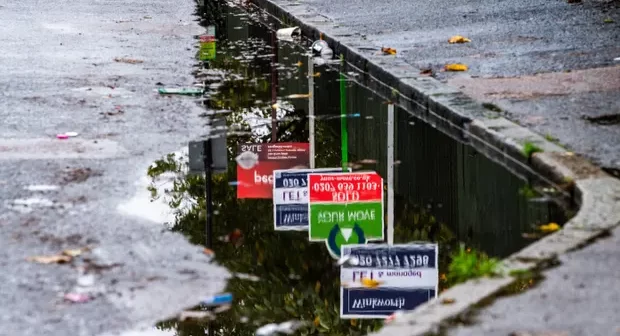UK house prices have fallen at their fastest rate for two and a half years as the fallout from Liz Truss’s disastrous mini-budget put buyers off according to Nationwide, which warned inflation and rising interest rates would weigh on the market in the coming months.
The price of an average home dropped 1.4% to £263,788 in November, according to the lender’s house price index, accelerating a slowdown that saw prices fall 0.9% in October. It was the third monthly fall in a row, and the biggest drop since June 2020.
On an annual basis, annual house price growth slowed sharply to 4.4% in November, from 7.2% a month earlier.
The slowdown in November illustrated the lasting impact of September’s mini-budget, which spooked markets and increased borrowing costs. While government borrowing rates have eased since then, average fixed mortgage rates are still hovering at about 5% and have continued to weigh on demand.
Nationwide said a larger proportion of people have been priced out of the market and have needed to borrow more money to buy a home.
Surging inflation hit 11.1% in October – its highest level since 1981 – on the back of surging energy bills, which has reduced the spending capacity of UK households, including prospective homebuyers.
The slowdown in house prices indicates that the market has cooled relative to the strong growth observed during the pandemic, when in the “race for space” people sought larger homes after UK-wide lockdowns.
Nationwide warned on Thursday that the housing market was unlikely to recover those losses anytime soon, as policymakers at Threadneedle Street ratchet up interest rates further in an attempt to combat climbing prices.
“The market looks set to remain subdued in the coming quarter,” Gardner said. “Inflation is set to remain high for some time and [the]Bank rate is likely to rise further as the Bank of England seeks to ensure demand in the economy slows to relieve domestic price pressures.
“The outlook is uncertain, and much will depend on how the broader economy performs, but a relatively soft landing is still possible.”
However, Gardner said homeowners were still in a relatively strong position, despite the oncoming recession and prospect of higher rates, given that about 85% of mortgages were on fixed-term home loans.
Source: The Guardian

